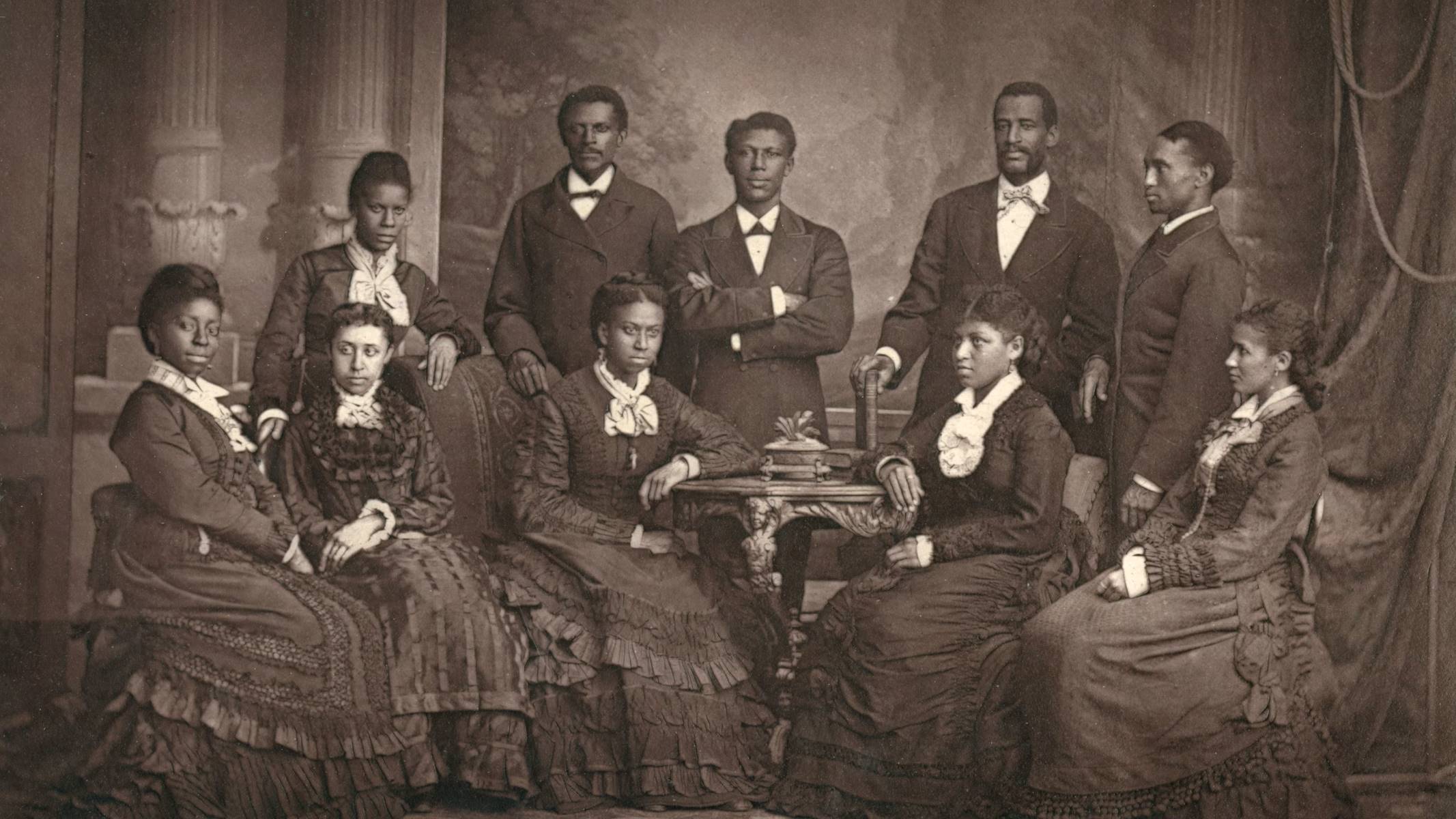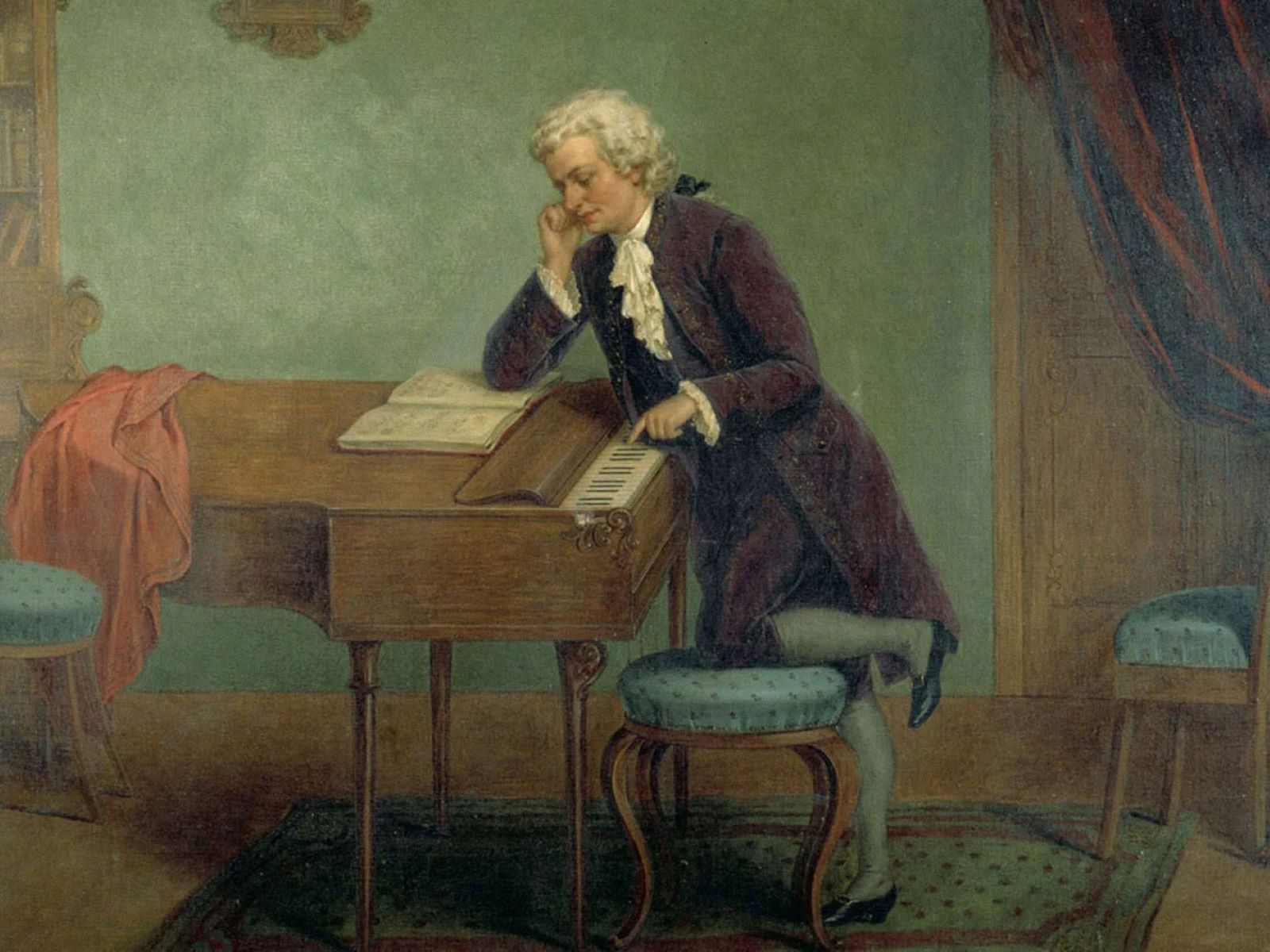Home>Arts and Culture>The Surprising Origins Of Gospel Music: Unveiling Its African American Roots


Arts and Culture
The Surprising Origins Of Gospel Music: Unveiling Its African American Roots
Published: February 11, 2024
Discover the rich and diverse history of gospel music, tracing its roots back to African American culture. Uncover the surprising origins and evolution of this art form in the context of Arts and Culture.
(Many of the links in this article redirect to a specific reviewed product. Your purchase of these products through affiliate links helps to generate commission for Regretless.com, at no extra cost. Learn more)
Table of Contents
Introduction
Gospel music is a vibrant and soul-stirring genre that has captivated audiences around the world with its powerful melodies and uplifting lyrics. Its roots run deep, originating from the rich cultural tapestry of African American history. The evolution of gospel music is a testament to the resilience, creativity, and spiritual fervor of a people whose journey has been marked by both adversity and triumph.
From the heart of African American communities to the grand stages of global recognition, gospel music has transcended boundaries and resonated with diverse audiences. Its profound impact on the music industry and its ability to inspire and uplift listeners make it a cultural treasure with a captivating history.
In this article, we will delve into the fascinating origins of gospel music, shedding light on its African American roots and the cultural influences that have shaped its distinctive sound. We will explore the pivotal role of African American spirituals, the enduring influence of African rhythms and melodies, and the evolution of gospel music within African American churches. Furthermore, we will examine the profound impact of gospel music on American culture, highlighting its enduring legacy and significance.
Join us on a captivating journey through the history of gospel music, as we uncover the remarkable story of a genre that continues to touch the hearts and souls of people around the world.
The African Origins of Gospel Music
The roots of gospel music can be traced back to the African continent, where the vibrant rhythms and spiritual fervor of African musical traditions laid the foundation for the genre's evolution. The diverse cultures and traditions of Africa infused gospel music with a rich tapestry of influences, shaping its distinctive sound and emotive resonance.
African musical traditions, characterized by rhythmic drumming, call-and-response singing, and communal participation, formed the bedrock of gospel music's expressive and dynamic nature. The deeply spiritual and communal aspects of African music were seamlessly woven into the fabric of gospel music, infusing it with a profound sense of connection and emotional depth.
The spiritual practices of African communities, steeped in reverence for ancestors, nature, and the divine, provided a spiritual framework that would later resonate within the lyrical themes of gospel music. The concept of music as a conduit for spiritual expression and communal worship was deeply ingrained in African traditions, laying the groundwork for the soul-stirring and transcendent nature of gospel music.
The journey of gospel music from its African origins to its prominence in African American culture is a testament to the resilience and creativity of a people whose legacy continues to shape the musical landscape. The fusion of African musical heritage with the experiences of enslaved African Americans in the United States gave rise to the spirituals and hymns that would form the cornerstone of gospel music.
As gospel music evolved, it retained the essence of its African origins, embracing the rhythmic vitality, emotional intensity, and spiritual resonance that are hallmarks of African musical traditions. The enduring influence of African musical roots continues to permeate gospel music, infusing it with a timeless and universal appeal that transcends cultural boundaries.
In essence, the African origins of gospel music serve as a testament to the enduring legacy of African musical traditions and their profound impact on the evolution of a genre that continues to inspire, uplift, and unite audiences across the globe.
The Role of African American Spirituals
African American spirituals, also known as Negro spirituals, emerged as a powerful and poignant form of musical expression rooted in the experiences of enslaved African Americans. These spirituals served as a means of solace, resilience, and communal solidarity amidst the harsh realities of slavery. The role of African American spirituals in the evolution of gospel music is deeply significant, shaping the genre's lyrical themes, musical styles, and emotional resonance.
The lyrical content of African American spirituals reflected the profound spiritual faith and unwavering hope of enslaved individuals. Through poignant verses and emotive melodies, spirituals conveyed themes of liberation, perseverance, and the yearning for freedom. These songs became a source of strength and resilience, offering solace and a sense of spiritual connection in the face of adversity.
Furthermore, African American spirituals served as a form of communal expression and solidarity within enslaved communities. The call-and-response structure of spirituals fostered a sense of collective participation and unity, allowing individuals to find solace and strength in their shared experiences. This communal aspect of spirituals became a cornerstone of gospel music, emphasizing the importance of collective worship and shared spiritual experiences within African American churches.
Musically, African American spirituals were characterized by emotive melodies, haunting refrains, and rhythmic vitality that resonated with the deep emotions and spiritual fervor of enslaved individuals. The improvisational nature of spirituals allowed for personal expression and emotional release, creating a deeply moving and authentic musical form that would influence the evolution of gospel music.
The enduring legacy of African American spirituals in gospel music is evident in the lyrical themes of faith, redemption, and liberation that continue to permeate gospel songs. The emotional depth and spiritual resonance of spirituals have left an indelible mark on gospel music, infusing it with a profound sense of connection to the experiences and spiritual heritage of African Americans.
In essence, the role of African American spirituals in the evolution of gospel music is a testament to the resilience, faith, and creative expression of a people whose enduring legacy continues to shape the cultural landscape. The spirituals served as a powerful form of musical resistance, resilience, and spiritual affirmation, laying the groundwork for the emergence of gospel music as a transformative and uplifting genre.
The Influence of African Rhythms and Melodies
The influence of African rhythms and melodies on the evolution of gospel music is profound and far-reaching, shaping the genre's musical styles, emotive resonance, and rhythmic vitality. African musical traditions, characterized by vibrant drumming, intricate polyrhythms, and pulsating beats, laid the foundation for the rhythmic dynamism and expressive energy that define gospel music.
African rhythms, renowned for their infectious energy and syncopated patterns, infused gospel music with a pulsating heartbeat that animates the genre's melodies and drives its emotional intensity. The polyrhythmic complexity of African music, where multiple rhythmic patterns intertwine and intersect, contributed to the rhythmic diversity and complexity evident in gospel music. This rhythmic richness, characterized by interwoven percussion and syncopated phrasing, imparts a sense of dynamism and vitality to gospel music, inviting listeners to engage with its infectious rhythms and spirited cadences.
Moreover, the melodic influences of African music, characterized by haunting vocal refrains, melismatic ornamentation, and emotive expressiveness, imbued gospel music with a profound sense of emotional depth and spiritual fervor. The call-and-response singing prevalent in African musical traditions found resonance in gospel music, fostering a sense of communal participation and shared expression within African American churches. This melodic interplay, where soloists and congregations engage in a musical dialogue, creates a sense of unity and collective worship that is intrinsic to the gospel music experience.
The enduring influence of African rhythms and melodies in gospel music is evident in the genre's vibrant musical arrangements, emotive vocal performances, and rhythmic exuberance. The fusion of African rhythmic vitality and melodic expressiveness with the spiritual themes and lyrical depth of gospel music has resulted in a genre that resonates with profound emotional power and universal appeal.
In essence, the influence of African rhythms and melodies on gospel music serves as a testament to the enduring legacy of African musical traditions and their transformative impact on the evolution of a genre that continues to inspire, uplift, and unite audiences across cultural boundaries. The rhythmic and melodic tapestry of African music has left an indelible imprint on gospel music, infusing it with a timeless vitality and emotional resonance that transcends generations and resonates with the human spirit.
The Evolution of Gospel Music in African American Churches
The evolution of gospel music within African American churches is a testament to the enduring legacy of a genre that has provided spiritual solace, communal expression, and musical inspiration for generations. From its humble beginnings within the confines of segregated worship spaces to its widespread influence on the global music landscape, gospel music has undergone a remarkable journey shaped by the cultural, social, and spiritual dynamics of African American churches.
In the early years, gospel music served as a form of spiritual expression and communal worship within African American churches, providing a platform for congregations to unite in faith and share in the transformative power of music. The fervent spirituals and hymns that echoed through the pews and halls of these churches became a source of strength, resilience, and hope for a community grappling with the enduring legacy of slavery and the challenges of racial inequality.
As gospel music evolved, it embraced a diverse array of musical styles and influences, reflecting the cultural tapestry of African American communities. The incorporation of jubilant rhythms, emotive vocal harmonies, and impassioned sermonic delivery created a dynamic and engaging musical experience that resonated with congregants and transcended the confines of the church walls.
The emergence of gospel choirs, with their exuberant vocal arrangements and spirited performances, became a hallmark of African American church services, infusing worship with a sense of joy, celebration, and communal participation. The infectious energy and uplifting spirit of gospel music transformed church services into vibrant expressions of faith, where congregants found solace, inspiration, and a sense of spiritual renewal.
Furthermore, the evolution of gospel music within African American churches contributed to the emergence of influential gospel artists and musicians who would shape the genre's trajectory and impact the broader music industry. The innovative blend of traditional spirituals with contemporary musical elements gave rise to a diverse spectrum of gospel music, ranging from traditional gospel hymns to soul-stirring gospel blues and the exuberant sounds of gospel jazz.
The enduring legacy of gospel music within African American churches is a testament to its profound impact on the spiritual, cultural, and musical heritage of a community whose resilience and creativity continue to shape the global music landscape. The evolution of gospel music within African American churches exemplifies the transformative power of music as a vehicle for spiritual expression, communal solidarity, and cultural affirmation, making it a cherished and enduring tradition that continues to inspire and uplift audiences around the world.
The Impact of Gospel Music on American Culture
The profound impact of gospel music on American culture transcends the boundaries of musical expression, resonating deeply with the social, spiritual, and artistic fabric of the nation. From its humble origins within African American communities to its widespread influence on the global music landscape, gospel music has left an indelible mark on American culture, shaping the collective consciousness and inspiring a diverse array of artistic expressions.
Gospel music has served as a powerful catalyst for social change, providing a platform for marginalized voices to articulate their experiences, express their resilience, and advocate for justice and equality. The lyrical themes of faith, liberation, and spiritual empowerment embodied in gospel music have resonated with the civil rights movement, offering a source of inspiration and solidarity for activists and advocates striving for racial equality and social justice. The anthemic power of gospel music has infused protest movements with a sense of hope, resilience, and collective determination, amplifying the voices of those seeking to effect positive change within American society.
Furthermore, the influence of gospel music extends beyond its spiritual and social dimensions, permeating the artistic and cultural landscape of the United States. The vibrant rhythms, emotive melodies, and impassioned vocal performances characteristic of gospel music have influenced a myriad of musical genres, from soul and R&B to rock and hip-hop, shaping the evolution of American popular music and contributing to the diverse tapestry of musical expression.
Moreover, gospel music has provided a platform for the celebration and preservation of African American cultural heritage, serving as a testament to the resilience, creativity, and spiritual fervor of a community whose legacy continues to enrich the cultural mosaic of the nation. The enduring influence of gospel music on American culture is evident in its pervasive presence within the realms of popular music, film, television, and live performance, where its emotive resonance and transformative power continue to captivate audiences and inspire a sense of unity and shared experience.
In essence, the impact of gospel music on American culture is a testament to its enduring legacy as a transformative and unifying force that transcends cultural, social, and artistic boundaries. The genre's ability to inspire, uplift, and resonate with diverse audiences underscores its significance as a cherished and influential art form that continues to shape the cultural landscape of the United States.
Conclusion
In conclusion, the remarkable journey of gospel music unveils a captivating narrative that intertwines the spiritual, cultural, and musical heritage of African American communities. From its origins rooted in the vibrant rhythms and spiritual fervor of African musical traditions to its enduring impact on American culture, gospel music stands as a testament to the resilience, creativity, and spiritual expression of a people whose legacy continues to shape the global music landscape.
The African origins of gospel music, infused with the rhythmic vitality and emotional depth of African musical traditions, laid the foundation for a genre that resonates with profound spiritual power and universal appeal. The role of African American spirituals, with their poignant lyrical themes and communal expression, served as a source of strength and resilience within enslaved communities, shaping the lyrical and emotional essence of gospel music.
The influence of African rhythms and melodies infused gospel music with a vibrant rhythmic dynamism and emotive resonance, creating a musical tapestry that transcends cultural boundaries and captivates diverse audiences. The evolution of gospel music within African American churches exemplifies the transformative power of music as a vehicle for communal worship, spiritual renewal, and cultural affirmation, fostering a sense of joy, celebration, and collective participation.
Moreover, the impact of gospel music on American culture extends beyond its musical dimensions, resonating deeply with the social, artistic, and cultural fabric of the nation. The genre's anthemic power has served as a catalyst for social change, providing a source of inspiration and solidarity within the civil rights movement and amplifying the voices of those striving for justice and equality.
In essence, gospel music stands as a cherished and influential art form that continues to inspire, uplift, and unite audiences around the world. Its enduring legacy as a transformative and unifying force underscores its significance as a cultural treasure that continues to shape the cultural landscape of the United States and beyond.














